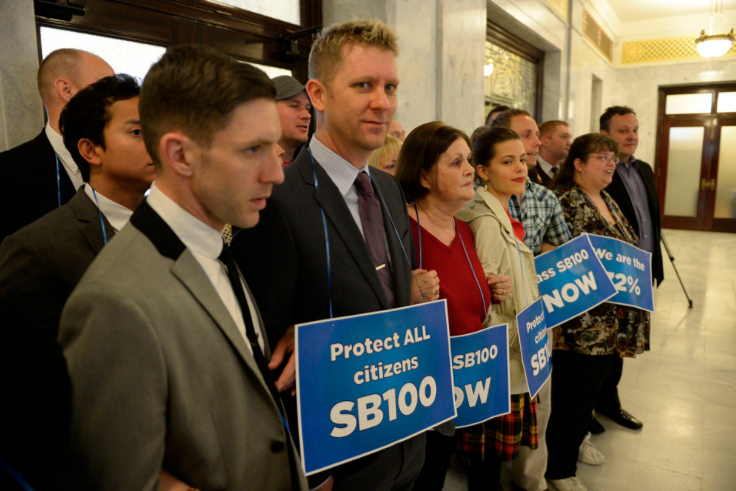
Troy Williams isn't the kind of guy you'd expect to see in a blue suit at the Utah State Capitol on a Monday afternoon. Williams, sometimes called the "gay mayor of Salt Lake," spends his time DJing at a community radio station and tweeting snark about Mormonism and Utah's conservative climate. In a city with very little counter culture, Williams is an icon.
But in February, Williams and a small band of supporters showed up at their capitol looking more like legislative aides than LGBT activists. Their goal: to make conservative Utah one of the most gay-friendly states in America.

WIlliams and the LGBT activists with him have two primary objectives. The first is obvious: win Utah's same sex marriage case as it moves through the higher courts. In December, the state stunned much of the rest of the U.S. when a judge suddenly legalized same sex marriage. State attorneys later got a court order putting a stop to the weddings, but during a 17-day window more than 1,200 couples tied the knot.
The ruling and subsequent weddings started the ball rolling in Utah and now the goal for LGBT activists is to win the case as it moves to a higher court.

The second objective — and the one that has consumed the most time and energy of late — is to pass meaningful non-discrimination law in the Beehive State. The activists focused on Utah Senate Bill 100, a law that would prohibit discrimination in Utah — specifically for employment and housing — based on sexual orientation.
As Utah's legislative session began in January, the momentum for the bill appeared to be real. Sponsored by a Republican from Utah's even-more-deeply conservative south, polls showed popular support in the state for non-discrimination. Salt Lake City already has a similar municipal law on the books, and suburban communities were considering following suit.
Which is why many were surprised when the bill effectively died in February after a group of Senate Republicans refused to consider it. Their reasoning was that they weren't going to do anything related to LGBT issues until Utah's same sex marriage case had run its course.
That, in turn, prompted Williams and his group of activists to spring into action: on Feb. 10 they orchestrated a sit-in outside a legislative committee room, blocking the entrance and demanding lawmakers bring SB 100 up for debate. Spirits were high at the sit-in; Williams circulated through a crowd that outnumbered the protesters, smiling, answering questions and doing interviews. For much of the day, TV lights rained a perpetual glare on the group. And nearby, a cadre of reporters sat on the ground, tapping on laptops as they wrote the latest chapter in Utah's LGBT story.
The sit-in ended when the Utah Highway Patrol — which provides security at the Capitol — finally received orders to arrest the group. In all, 13 activists were zipped tied and led away to jail. Many of them smiled as they went.

The arrests didn't revive SB 100. And for the time being, same sex couples in Utah can't get married. But together the push toward marriage and non-discrimination has also kept LGBT issues alive in the public consciousness; almost daily more groups line up on either side of the issues. The Church of Jesus Christ of Latter-Day Saints, or the Mormons, have come forward as the most powerful group in Utah to oppose same sex marriage. But an array of other Utah-based churches have taken up the opposite position, joining the plantiffs' side in the marriage case. Earlier this month, a group of Republicans also signed on as supporters of same sex marriage.
Williams and the other activists, dubbed the "Capitol 13" after their arrests, also plan to keep fighting. They plan to plead not guilty to misdemeanor charges and return to the Capitol for future demonstrations. Any actual legislative change may have to wait until next year, but in the meantime support apparently is growing. Williams has called the effort "self defense" and added that the LGBT community has been "under assault at the Utah Legislature for years."
The difference now, however, is that for the first time ever in Utah, the LGBT community's efforts to strike back are making serious headway, making the state both a battleground and a bellwether.



